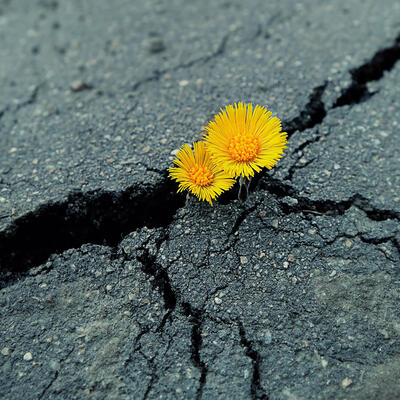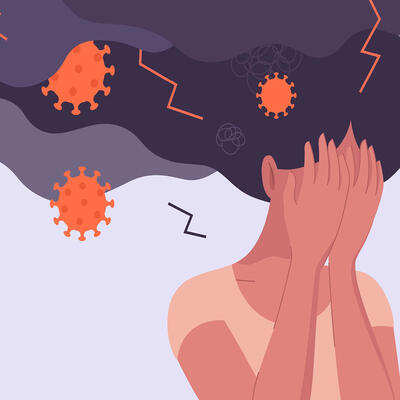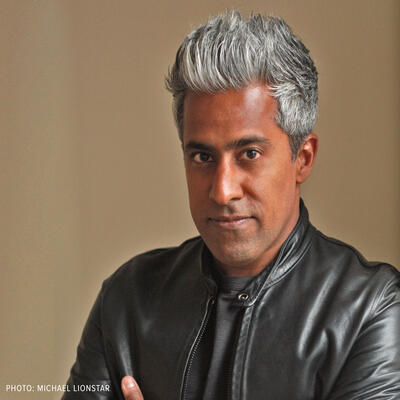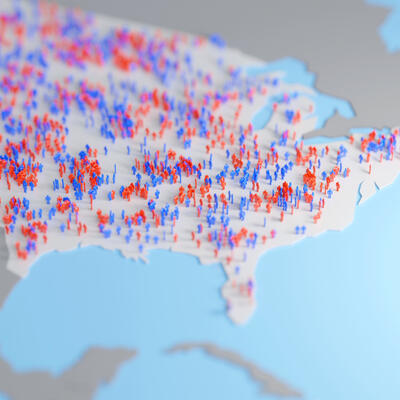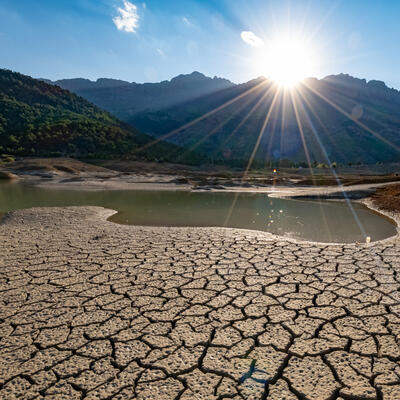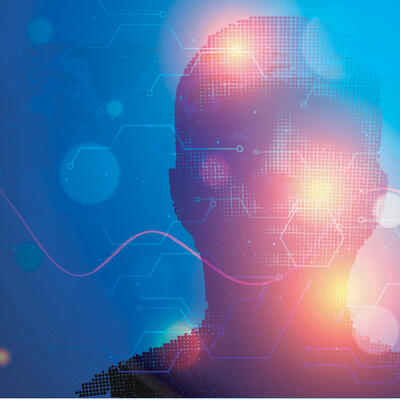
COVID-19 and Climate: Human Response
Guests
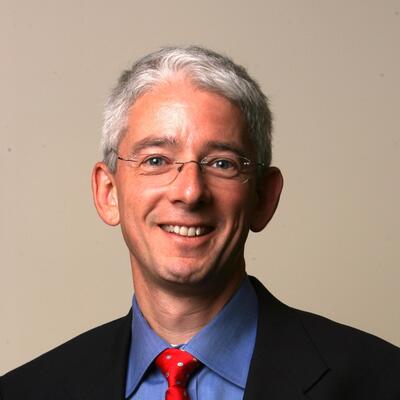
Peter Atwater
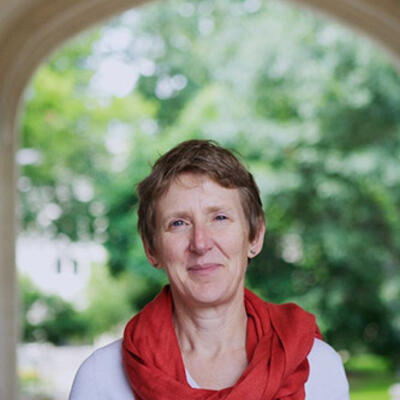
Susan Clayton
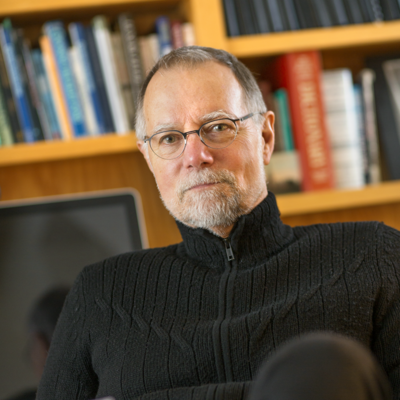
Robert Frank
Summary
How do human beings respond to invisible threats like the coronavirus and carbon pollution? One threat is personal, direct, and close – touch an infected surface or talk too close to someone and you could be deathly sick in a matter of days. The other is impersonal, indirect, and far away– driving your car contributes in some tiny way to future melting glaciers, rising seas, and scorching heat waves. And yet responding to both requires a similar shift in mindset and behavior.
“The idea that we need some way to restrain what we ourselves do individually to secure a better outcome for the collective, for us generally, is a deep similarity between the two cases,” says Robert Frank, Professor of Management at the Cornell School of Business. “What's expeditious for an individual to do is often just a horrible thing for the community if people do it.”
As the world reacts to the novel coronavirus by demanding individual action for the collective good, some are asking when the climate threat will inspire similar action.
”Disease is a lot more immediate, a lot more scary than the idea that were gradually destroying or harming the atmosphere and the ecosystem,” says Susan Clayton, Professor of Psychology at the College of Wooster. She further notes how the public messaging about the coronavirus amplifies this impression.
“We don't have a lot of people who are very prominent talking about how scary climate change is. But we do have a lot of people talking about how scary COVID-19 is.”
The pandemic has dominated and changed the conversation about everything – including climate.
“Even just a few weeks ago a few months ago you saw this extraordinary energy around climate change that I'm worrying now has been evaporated,” says Peter Atwater, who teaches Economics at the College of William & Mary, “because we've gone from an us, everywhere, forever mindset to a me, here, now, mindset.”
This program was recorded at the Commonwealth Club in San Francisco on March 24, 2020,
Additional interviews:
Shannon Osaka, Climate Reporter, Grist
This program was a part of our special series, COVID-19 and Climate. You can listen to the other episodes with the links below:
COVID-19 and Climate: Implications for Public Health COVID-19 and Climate: Economic Impacts COVID-19 and Climate: The Future of Energy COVID-19 and Climate: Implications for our Food system
Full Transcript
Greg Dalton: This is Climate One. I’m Greg Dalton. The COVID pandemic has unfolded with unprecedented drama and speed.
Peter Atwater: You could see the level of anxiety turn to panic as it went from being a foreign contained to being near us to now being among us.
Greg Dalton: COVID-19 and carbon pollution are both invisible and deadly threats. But is that all they have in common?
Robert Frank: The idea that we need some way to restrain what we ourselves do individually to secure a better outcome for the collective, for us generally, is a deep similarity between the two cases.
Greg Dalton: As the world reacts to the virus, some are asking when the climate threat will inspire similar action.
Susan Clayton: Disease is a lot more immediate a lot more scary than the idea that were gradually destroying or harming the atmosphere and the ecosystem. (10’’)
Greg Dalton: COVID and Carbon: Human response to invisible threats. Up next on Climate One.
---
Greg Dalton: How is the climate conversation changing in the wake of the COVID panemic? Climate One conversations feature oil companies and environmentalists, Republicans and Democrats, the exciting and the scary aspects of the climate challenge. I’m Greg Dalton.
It’s been fascinating recently to compare how people are responding to two invisible threats - the coronavirus and carbon pollution. One threat is personal, direct and close. Touch an infected surface or talk too close to someone and you could be deathly sick in a matter of days. The other is impersonal, indirect and far away. Driving your car contributes in some tiny way to future melting glaciers, rising seas and scorching heat waves. In upcoming episodes we are going to explore the health, economic, political and other dimensions of the two crises.
Today we are focusing on the human and behavioral responses. Addressing COVID-19 and climate requires individuals to think beyond themselves.
Robert Frank: What's expeditious for an individual to do is often just a horrible thing for the community if people do it.
Greg Dalton: Robert H. Frank is Professor of Economics at Cornell University's Johnson Graduate School of Management. He’s a former columnist for the New York Times and author of Under the Influence: Putting Peer Pressure to Work. The COVID pandemic has changed the conversation about everything – including climate.
Peter Atwater: Even just a few weeks ago a few months ago you saw this extraordinary energy around climate change that I'm worrying now has been evaporated because we've gone from an us, everywhere, forever mindset to a me, here, now, mindset.
Greg Dalton: Peter Atwater is Adjunct Economics Professor at the College of William & Mary. He studies confidence driven decision-making and trends in his Financial Insights newsletter. Our reactions to some emergencies may be as much about what we learn as how we learn about them.
Susan Clayton: We don't have a lot of people who are very prominent talking about how scary climate change is. But we do have a lot of people talking about how scary COVID-19 is.
Greg Dalton: Susan Clayton is Professor of Psychology at the College of Wooster, where she’s also Chair of Environmental Studies. She co-authored the American Psychological Association report on psychology and global climate change. All three recently joined me from the safety of their homes to explore the human reaction to pandemics and other invisible threats – starting with a tickle in Susan’s throat in the middle of the night.
Susan Clayton: I overreacted, I thought, oh no I have the coronavirus I’m doomed essentially. And it took just a second or two for my rational mind to kick in and tell me that that was very unlikely. But it’s that instinctive reaction that I think explains a lot of the kind of we actually see among other people as well.
Greg Dalton: And how does that the reaction to this virus which is invisible. How do you see that compared to this gas, carbon pollution, which is also invisible and deadly and harmful in a different way. How do you compare those two our human responses?
Susan Clayton: Yeah, well clearly we’re responding a lot more strongly to the coronavirus than to climate change. And part of the reason for that is disease is a lot more immediate a lot more scary than the idea that were gradually destroying or harming the atmosphere and the ecosystem. So we definitely respond to that idea that our personal health is compromised. But I also think it's important to recognize that both of these things because they are invisible people are kind of relying on, they need to have the situation interpreted for them. So there's a really big role for the social media for political figures and other people who are prominent invisible to explain to them. In one case we don't have a lot of people who are very prominent talking about how scary climate change is. But we do have a lot of people talking about how scary COVID-19 is.
Greg Dalton: And we’ll get to the social media in a minute. Peter Atwater, you likened this moment where we have this looming threat that you liken it to when Hurricane Katrina was barreling down on the Gulf Coast. And there's this big scary thing offshore it’s coming we can kind of watch it coming our way. How do you compare that Katrina moment to what we've been watching experiencing with COVID-19?
Peter Atwater: So what you could see was that particularly from an American perspective, when the virus was contained in China that was the first narrative that went along with that, there you have an existential threat that was far, far away and really not a threat with the view that it was contained. And what I could watch and see was the narratives brought it closer and closer to us in terms of proximity. And one of the things about threats is that our anxiety rises exponentially as threats become closer and closer to us from a perception standpoint. And so you could see the level of anxiety turned to panic as it went from being a foreign contained to being near us to now being among us.
Greg Dalton: Right. I mean I was a reporter in China in the 1980s and studied China and have heard of pandemics. But at no point when I read about Wuhan did I anticipate that it would come here and have the impact and I think maybe I’m ignorant of the science and some people might feel that way about climate change. Robert Frank, how do you see the way individuals are responding to these distant threats and very different invisible threats?
Robert Frank: Well, I think Susan hit it on the head with the distinction between what seemed like a distant threat on the one hand, that's the way many people view the climate threat and the virus threat which is really quite immediate. I mean you have two weeks from the time you're exposed to it to the moment you might be faced with a genuine threat to your life. And what we know is that people are just not very good at reckoning how to deal with threats that seem distant many years into the future. There's some interesting work by an economist at UCLA and he shows people pictures of themselves that are digitally altered to simulate what they would look like at age 80 or so. And after having had a chance to study the image of yourself at age 80 people become much more future oriented in little experiments that he asked them to make choices between now and later. People are much more future oriented. So I think it’s what Pigou called the faulty telescopic faculty. We can't look ahead and put adequate weight on the future. What’s changed in recent years, fortunately, is that the extremity of weather events the fires the droughts and floods have persuaded many people that climate crisis is not just a phenomenon at all it’s really upon us. And so now I think many more people are willing to take seriously the fact that we take action to try to parry the threat compared three or four years ago it’s a much bigger change than I think I saw it coming.
Greg Dalton: So there's important differences on time and proximity, you know, a gunshot somewhere in a city is one thing but a gunshot on your block gets your attention a lot more dramatically. Susan Clayton, what’s the importance of actually seeing, you know, we hear information we read, but we live in a very visual age, particularly video social media. How important is it to see someone I watch 60 minutes someone being carried into a hospital in one of those cocoons. It’s like how important is seeing versus other ways of processing information?
Susan Clayton: Well, I think, you know, Robert hit the nail on the head when he talked about how something seemed very distant another things begin to seem very close to us. And timescale is one of the things that can make them seem distant or not. And a visual display can also bring it home and make it much more personal. It's not the only way for people to feel that something is close but it is something that tends to have an impact we’re a very visual species and, you know, even a little bit of visual information entering your field of vision will grab your attention. So when we see a striking image it tends to have a major impact.
Greg Dalton: Journalist Shannon Osaka covers climate change for Grist. She recently wrote an article detailing how the spread of zoonotic animal borne diseases like the coronavirus have been aided by a warming climate and the destruction of animals’ natural habitat.
[Start Playback]
Shannon Osaka: In the decade of the 1950s about 30 new infectious diseases were reported. And in the 1980s, the number jumped to almost 100. And scientists think that a big part of this is based on how our relationship has changed with the natural world. Our encroachment on wildlife has just dramatically increased. We have deforested large portions of the planet our urbanization is impinging on habitats that we used to pretty much leave alone. And a lot of infectious diseases that we think about as being a big deal today so that includes SARS, MERS, Middle East Respiratory Syndrome and now the coronavirus. They often originate from bats. And as we encroach on sort of wildlife and habitats we see those bats basically coming more into contact with humans more into contact with other wildlife that might contact humans. And all of that means that the possibility of a virus traveling from bats to humans goes way up. There was a study in 2017 about Ebola outbreaks and Ebola has also been linked to bats. And the study found that areas of central and west Africa, which had recently been deforested had a higher incidence of Ebola outbreaks. And there's a lot of scientists who have been out there kind of sounding the alarm and saying, look, we know that when we are deforesting when we’re doing habitat destruction, but also warming temperatures causes animals to move from their traditional areas. And so that can mean animals coming more into contact with humans and it can also mean animals coming into contact with other animals and that can also cause other forms of spillover. What we’re seeing now is really not the worst thing that could happen. The coronavirus is not extraordinarily fatal. And so a lot of the experts I talked to said, you know, we should see this as kind of a shot over the bow. The natural world is kind of saying, hey look this is the kind of thing that can happen and there is a possibility that future pandemics could be worse.
[End Playback]
Greg Dalton: That was Grist magazine reporter Shannon Osaka. Peter Atwater, your reaction that this could be things could be worse. So maybe there's some messages there about our relationship with nature.
Peter Atwater: Well, I think that when confidence starts to fall we naturally fall into that cycle of things being worse. We’re looking for conditions to deteriorate even further and so it’s something that we're magnetized either to overconfidence or to under confidence. And right now I think there is in any number of ways I'm seeing lots of lots of not just reassessment of risk, but potentially an over assessment of risks.
Greg Dalton: Are you saying we’re overreacting?
Peter Atwater: No. I’m just saying that with confidence being lower than it has been we are prone to overreact to things that we view as threats.
Greg Dalton: Robert Frank, there’s kind of a backlash now saying we open America we’ve gone too far. Do you think there’s a reassessment of risk happening?
Robert Frank: Well, we certainly know that there are some people among us who are not overreacting to the risk. I'm sure you like the rest of us saw those clips of the revelers in Florida last week, why should I interrupt my long planned trip for spring break just because there's a virus out there. I might get it but so what, I’m young I’m not gonna suffer much from it. So I think there is a sort of a clear trail of people who were just not at all concerned or not nearly as concerned as they ought to about the risks if not to themselves at least to other people that even they care about never mind the people that we all care about. So I think there is upside to being too alarmed, there’s a downside to be too alarmed. If you had to choose between those in the current moment I’d say being too alarmed is probably the better choice.
---
Greg Dalton: You’re listening to a Climate One conversation about responding to invisible threats. Coming up, looking for leadership in the midst of crisis.
Susan Clayton: I think this is a case where many people are recognizing that you do need to have government help, government advice, government regulations to really get through this
Greg Dalton: That’s up next, when Climate One continues.
---
Greg Dalton: This is Climate One. I’m Greg Dalton, and we’re talking about the invisible threats of COVID-19 and climate change with Peter Atwater, Adjunct Professor of Economics at the College of William & Mary; Susan Clayton, Professor of Psychology at the College of Wooster, where she’s also Chair of Environmental Studies; and Robert Frank, Professor of Economics at Cornell University's Johnson Graduate School of Management. Robert explains how the notion of “behavioral contagions,” which he wrote about recently in the Athlantic, sheds light on our responses to both the coronavirus and climate.
Robert Frank: It’s the term that behavioral scientists use for how ideas and behaviors can spread from one person to another very much like a virus wide spread in a population. There are some important similarities between how behaviors and ideas spread and how viruses spread but there’s some differences too. One difference is that visibility helps ideas and behavior spread. So if your neighbor has a solar panel on his roof and it's in the front of the house where you can see it from where you sit that's much more likely to stimulate you to consider an installation than if it were in the back where you couldn’t see it. So visibility is a helpful thing and behavioral contagion stimulates others to mimic what you do. If we see somebody close to us, who's obviously sick we try to give that person wide berth we don’t want to mimic the neighbor who is sick, we try to avoid that person. So that’s a key difference but other similarities are abundant. I mean the idea that what's good for you as a person is often not good for us as a group is a deep similarity between the two cases. So if you think of the familiar stadium metaphor I stand to see better because the people in front of you are standing. When we all stand none of us see as any better than if everybody had remained comfortably seated. That's a collective action problem it doesn't mean I'm irrational to have stood. I don't regret having stood if I hadn't, I wouldn’t see it all. But we need some way to restrain what we ourselves do individually to secure a better outcome for the collective for us generally. And I think that's exactly the problem that we’re up against with trying to contain a virus. What's expeditious for an individual to do is often just a horrible thing for the community if people do it.
Greg Dalton: Susan Clayton, would a normal person standing up in a stadium, would they feel guilty about blocking anyone's view or feel any sense of responsibility if they’re partying on a beach in Florida when they kind of know it's not the right thing?
Susan Clayton: Well, I can only guess what the people on the beach in Florida were thinking. But I suspect no, because they looked around and everybody else is doing the same thing. So they were getting immediate support from their social context even if across the country people were saying what are you doing. And that’s one of the things about behavioral contagion it’s often literally the people who are physically closest to us are gonna be most influential. Doesn't have to be just physical distance it could be people who are closest to us in other ways. So as long as people who are similar to us are acting in a particular way we might not care at all what other people think about what we're doing.
Greg Dalton: Peter Atwater, there was the Tom Hanks moment for the coronavirus that was certainly someone who is widely beloved. Tell us about that American symbol of what that meant.
Peter Atwater: Yeah, so I think you had with Tom Hanks it was interesting within a half an hour you had the report that he and his wife had been impacted by the virus as well as the news from the NBA that the Utah Jazz has been infected. And I think those symbols are really powerful and important in terms of bringing that familiarity that Susan discussed very close to us. So suddenly people felt that if Tom Hanks had it, if an NBA player had it, it was likely to impact me. And what you could then see was this cascading impact in terms of cancellations and closures. That to me was one of the major tipping points of this crisis is that through that conveyance the symbols the virus outbreak suddenly felt right upon us and then you saw people respond accordingly.
Greg Dalton: And Susan Clayton, that makes me think of vulnerability it’s like oh my gosh if Tom Hanks can get it, you know, if Private Ryan can get it what is that mean about a normal person. So talk about the vulnerability and how we assess our different vulnerability to these different threats.
Susan Clayton: Absolutely and it’s not just Private Ryan, it’s Mr. Rogers. So I think there was that that Tom Hanks is not only somebody that everybody recognized and therefore it became much more real and immediate. But we do have this recognition probably at some instinctive level that we're all vulnerable to disease. We can feel very threatened by it. We like to avoid things that might lead to contamination. And unfortunately that kind of reaction sometimes underlies a lot of racist responses particularly in this case. The idea that it’s a foreign a virus that is invading the American body politic certainly affecting some people's reactions. So that vulnerability to something coming from outside and something that in the case of a virus literally enters your body is disturbing on a very basic instinctive level.
Greg Dalton: When people feel vulnerable they’re not necessarily feeling confident and Peter, you talk about how that there's certain ages of confidence when this country has taken on big challenges. So tell us about particularly the 60s and how confident you see confidence has related to our national will to take on big challenges.
Peter Atwater: Sure. So when confidence is low the only thing we care about is me, here, now. And so all of our decision-making is in the context of physical relational time geographic proximity. And as confidence rises, it is if we’re wearing variable lens glasses. And suddenly we feel more comfortable in things that are distant from us. And I think that you saw in the 1960s that being expressed not just in terms of things like the space race and the rise of the multinational corporation but in terms of things like our interest in climate change. I mean you go back to the first environmental days that were really the focus as part of that we’re going to take on enormous challenges. And I think we've seen a similar echo to that very recently in terms of climate change being on the cover of Time Magazine. And interesting concurrence with things like, you know, Space X and Blue Origin that we're interested in taking on true transformational activities.
Greg Dalton: Robert I wanna ask you about whether you agree that sort of we’re able to tackle right now big things like climate change. We have a question from Susan Barnett on Facebook. How will this pandemic affect attitudes and policies about the ways in which our country can best proceed to deal with the climate change?
Robert Frank: You know, I think, a lot of the resistance to taking action about climate change is rooted in the fact that it will be very expensive to really make a meaningful dent in the problem. And what this crisis with the coronavirus will have illustrated is that when we need to do something cost is literally no object. If we must do something we can do it. We are an incredibly wealthy country the evidence from the very large and contentious literature on the determinants of human happiness suggests that beyond a certain point and it’s one we’ve long since passed in this country and in most of the West. Further increases in most forms of private consumption don't really have any real impact other than to raise the bar that defines what we feel we need. I was a Peace Corps volunteer in Nepal I lived in a two-room house with no running water and electricity. It never felt for a moment inadequate. If I lived in that house here I’d be dismayed, I wouldn’t want people to know where I live, I’d be ashamed. The context matters enormously everybody wants to succeed. Succeeding is just a purely relative construct. To succeed means to do well relative to some norm. And if we needed to come up with literally 2, 3, $4 trillion a year to deal with the threat, we could do that without anybody having to make any enduring sacrifice at all. The level of consumption would grow less quickly or would decline slightly for the people at the top of the ladder and that would not be any hardship at all for them to adjust to.
Greg Dalton: Robert, would you be willing to go back now to live in that conditions you lived in Nepal when you are in your 20s? If that would solve climate would you do it?
Robert Frank: If just by my doing that if that would solve the climate crisis so of course I would do it.
Greg Dalton: Susan Clayton, have you sacrificed or would you sacrifice for climate?
Susan Clayton: Oh absolutely. And I think that there’s a big distinction here if I knew that I myself by living in a two-room house in Nepal or we’re in Ohio would solve the problem of climate change, there's no question in the world I would do it even if I’m the only person who is doing it. But if I thought if all of us do that that will solve climate change and I'm the only one doing it then I would not gonna do it. So it’s a combination of individual responsibility and also individual efficacy, you know, what can I accomplish in my individual actions. I think that there are, you know, there are really two important things. One is how strongly we are influenced by the behavior of others. And that includes whether we’re likely to make sacrifices on behalf of the others are more likely to at least if we think other people also well. But there are clearly some people who will take these individual actions and not wait to see what other people are doing. And I think that's what for example Greta Thunberg did and had such a powerful influence for that reason. She didn't say, gee, you know, I’m just one person what can I do nobody else is doing anything. She just went on and did it. And most of us would not do that but the fact that she did it has had an enormous impact.
Greg Dalton: If you’re just joining us we’re talking about the invisible threats of COVID-19 and carbon pollution. Why are we responding to the coronavirus more aggressively than climate disruption that is also wreaking global havoc. I’m Greg Dalton. My guests are Peter Atwater, Adjunct Economics Professor at the College of William & Mary. Susan Clayton, Professor of Psychology at College of Wooster. And Robert Frank is Professor of Economics at Cornell University's Johnson Graduate School of Management. Robert Frank, in the great recession, you know in the stimulus package there was a lot of money for renewable energy that sort of thing. But then when the economy tanked all of the sudden that appetite oh we can’t afford to get off fossil fuels now it'll cost too much. We are in a recession now it is gonna be bad. Morgan Stanley said this recently they predicted that it could be 13% unemployment 30% drop in GDP in one quarter this is bad it’s gonna be bad. Does that mean that America's appetite for going green is gonna be decimated?
Robert Frank: I think when we're in a period of slump the appetite for spending on all manner of things gets decimated. The social progress that societies have made has most often come during periods of high economic growth rather than low economic growth. And I think that’s been an issue in the climate movement many people say we got to learn to live without growth in order to save the climate. But I think that's probably not the right way to frame the issue. What we know is that it's only growth in certain kinds of things that are damaging. And we really do have the policy levers to encourage growth in non-harmful activities and services and restrain growth in the ones that really cause harm and have overall a healthy rate of economic growth which we know politically makes it much more likely that societies will spend the money that they need to to make real social and economic change with respect to climate or any other goal we’re trying to achieve.
Greg Dalton: Peter Atwater, you study the market. Markets are down big time. Is it gonna be years before there is an appetite for making investments in green infrastructure. Gasoline is now tickling at a dollar a gallon, which means we can, you know, that means the SUV looks viable now.
Peter Atwater: I mean they're talking about negative oil prices potentially which is just hard to wrap our minds around. But I think that to the extent that confidence remains low you're going to see intense energy spent on what are the current problems that need to be addressed today. And so often and we saw this in 2009 it’s about restoring and remedying what exists right now. That the mindset is not towards the future it’s entirely towards the present. It’s that me, here, now, mindset. And so I do think that bold climate change policy action is likely to be on the back burner for some time. And depending on the speed of recovery that could be years if not decades.
Greg Dalton: Right. We have a question from Sean Adderley on YouTube. Will the COVID-19 pandemic lead to more people working remotely permanently that ends up reducing pollution by eliminating commuting. So perhaps there could be some behavioral changes here, Susan Clayton, that might stick and reduce carbon impacts.
Susan Clayton: Absolutely. I wanted to take a bit more optimistic viewpoint partly because not something I just try to do in general. That one thing that happens in times of a recession is usually that carbon emissions drop dramatically. And so I think that there will be there's already going to be probably some immediate benefits there and in the slightly longer-term people will get used to doing things differently. I think when you have this kind of, where at kind of a transition point and so will encourage people to rethink some things that they might not be willing to rethink if the economy was just purring along the way it had been. And that one in particular I think, I’m guessing that so many people had to get used to virtual meetings virtual business meetings virtual channel. I think a lot of that will stick and it might help a lot of business practices to become more efficient in that way.
Greg Dalton: Peter Atwater, you talk about how there's episodes of repetition. If this is viewed as a one-time random thing and it goes away and we get through it. That's different than something that repeats like a hurricane after hurricane after hurricane. So how do you think about what, how much this behavioral and social change from this COVID crisis will stick?
Peter Atwater: So I think the lasting unknown question today is as we handle this crisis have people been traumatized by this. That perception that it could happen again you know there's a lot of discussion that we will need a vaccine in order for the population to calm down about the potential risk of another pandemic sometime soon. So I think that that that vulnerability here with respect to the outbreak is going to be very important. Do we look at this as a one-time event in which case we’ll treat as a shock or is there some lingering sense that it could happen again. And they are the impacts could be quite, quite profound from people changing their consumption habits in terms of how much do you stockpile in your pantry. What are our expectations for businesses for supermarkets in terms of what is kept on the shelves. So there’s potential for profound change as we consider where we were vulnerable coming into this crisis.
Greg Dalton: Susan Clayton, I’d like to talk about blame. There's some blame about could the U.S. have done better obviously it’s been slow to respond. That's backward looking. What’s the role of blame now we’re in this crisis whether it's who's to blame for climate change or who's to blame for the slow U.S. response.
Susan Clayton: Yeah, blame is a really common reaction we all do it. I mean if I stub my toe I wanna find somebody to blame for that I don’t want to take personal responsibility for that. So we want to blame another country for the virus or we want to blame bad government policies. We want to blame other people for climate change for not doing anything in response. So I’m not upset, you know, I don’t get mad at people for this blame game but we have to move beyond it because it does have implications for actions. If we blame other people or big businesses for climate change then we don't take on individual responsibility for doing anything about it. If we blame another country for the coronavirus we might not think about policies that our country could implement that could protect us or do a better job of taking care of us.
Greg Dalton: Robert Frank, we’re seeing a stress on one system right now. Healthcare system financial system, but think about climate change scientists tell us there could be multiple cascading system stresses and failures, food, water, etc. So, how do you think about that and what the economic implications of what we’re seeing right now is a big stress and add-on floods in the Midwest this winter these things could really cascade.
Robert Frank: Yeah, and I think the fact of all of those threats being so vivid and so visible now really you have to think about that as a possible opportunity. Very seldom does any really big change occur, except in the wake of some sort of crisis or another. The great depression for example, was not solved by the programs that FDR adopted the WPA the CCC those helped but we didn't really get out of the great depression until the massive mobilization that we undertook during World War II. And I think once we’re in the midst of the downturn that's coming in the wake of this coronavirus disruption we're going to be in a depression that may even be much more serious and long-lasting in threat, at least, than the one we faced in the Great Depression. And that's really an opportunity to mobilize to undertake the kind of public investments that we really need to take if we’re to have any realistic hope of parrying the climate threat. The good news is that there are things we can do that would actually hold warming to an acceptable level. It's going to be difficult it’s gonna require a mobilization on the scale that we did during World War II. But we did that we got through that people were not unhappy because they were pulling hard for an objective during those years. And so creating jobs to undertake the green investment that's gonna be a way forward out of this coming recession. And I think if we stay focused we can really make a good outcome out of this rather than enduring bad one.
---
Greg Dalton: You're listening to a conversation about invisible threats: COVID-19 and carbon pollution. This is Climate One. Coming up: empathy, community, and hope.
Peter Atwater: I think there is an intense desire to understand and I think there's a real questioning in terms of what is true in this environment. And for an invisible threat that is critical.
Greg Dalton: That’s up next, when Climate One continues.
---
Greg Dalton: This is Climate One. I’m Greg Dalton. [Climate One records many of our conversations with a live audience at our modern and green new home on the waterfront in San Francisco. We have suspended public events through April and possibly beyond. When we resume public events and you are in town come check us out. Our programs are open to the public and listed on climateone.org.] We’re talking about our responses to the COVID and climate threats with Susan Clayton, Professor of Psychology at the College of Wooster; Robert Frank, Professor of Economics at Cornell University's Johnson Graduate School of Management; and Peter Atwater, Adjuct Professor of economics at the College of William & Mary. Peter sees an evolution in certain social arenas as we respond to the pandemic.
Peter Atwater: So I think you're seeing a lot of dramatic change in what it means to be a leader today. And so these are the environments where resilience, empathy, authenticity, reality are critical elements of what it means to be a leader in crisis. And so I think you're already starting to see changes in where people are going for those messages I think it's likely to have a major impact in terms of where we’re getting our news. How we’re dealing with social media. I think there is an intense desire to understand and I think there's a real questioning in terms of what is true in this environment. I think we've lived through the fake news environment and now it's gonna be a question where is the truth. And for an invisible threat that is critical.
Greg Dalton: Robert Frank, the purveyors of fake news love chaos and there's lots of, you know, there's lots of people out there fishing and trying to exploit people right now aren’t using their best judgment, right. So aren’t we vulnerable right now because we’re so afraid and does that bring out our better selves or our more protective, selfish selves?
Robert Frank: You know, I think it is good to be leery of those kinds of groups. We know they were quite prevalent during the 2016 election we’re seeing them again now in individual campaigns. But I think people are pretty good judges of character in the long run and the qualities that Peter mentioned in a leader are not qualities that are easy to fake if you are in command of the situation. If you're sleeping four hours a night and you're working with people intensively to get things done. You can pretend to be that kind of a leader for a little while, but it doesn't hold up for very long. I think the public in the end will make pretty sound judgments about who to listen to and who not to.
Greg Dalton: Robert Frank, you write about trust in your book when people tip when they don't have to or pay taxes when they won't get caught. I'm interested in how trust is being built or damaged right now when people are unsure of some people are coming together and taking time to connect with people they haven’t connected with because they’re so busy. And there’s also a little bit of distrust. Susan mentioned some of the racial tension, we’re afraid now, is that make us trust more or trust less?
Robert Frank: You know, I think I do see this as a time of coming together on balance. There are forces in the other direction too but on balance, I do think it will be one of coming together. And I think the issue of trying to do what's best for the community even though it might not be the most expeditious thing for you to do is what's going to separate people if you have something you'd like to do but you don't do it because you think it would expose people to more risk. Most of the people you will have helped by restraining your urge to do was in your interest won't know that you did it. It’s like leaving a tip when you're on the road you won’t come back and benefit from good service the next time because you’re not gonna come back. So why should you leave a tip in that situation? Well, the kind of person who takes that kind of action who denies himself or herself a benefit for the benefit of the community. In the process of doing that, you become a different kind of person. I mean we’re not born in the world with fixed identities we become who we are through repeated action. So, you become a better person when you do those sorts of things. And here's the key step. Other people have insight into the kind of person you are. If you’re the kind of person who would tip on the road when no one was looking, people who know you probably know that about you, even though they can’t have the opportunity to see that about you. And if people regard you as that kind of a person that's very much in your interest. So I think that shouldn’t be your reason for doing the right thing when no one is looking but it surely wouldn't hurt people to know that doing the right thing when no one's looking changes the kind of person you are in a way that makes others more likely to pick you as a member they want to be on their team.
Greg Dalton: Susan Clayton, are people conscious of that sort of thing that well, I’m doing the right thing by distancing and some person I don't know benefiting. And that somehow that's am I aware of that virtue, seek that virtue or is that more subconscious?
Susan Clayton: Oh I think some of us are. I think most people, at least some of the time are trying to be good people and that we can engage in a lot of rationalization about how it’s consistent with am I being a good person to never less do something that maybe it’s not so good. But to the extent they were thinking about it I think if we really believe that we will be harming others by coming too close then we’ll be trying not to do that. One thing I particularly been seeing a lot, you know, I live in a fairly small community but I’ve seeing a lot of community cohesion. So I think I wanna echo that idea that people are coming together a lot of emphasis on supporting the local businesses and the local restaurants and promising to go there more often when they open again. People posting that they have some, you know, young adult children who are home from college maybe with nothing to do and they can run errands for people who might need something. So I think it’s kind of atmosphere does encourage that kind of coming together as we recognize our dependence on each other much as we might not want to recognize it. I think we are confronted with that.
Greg Dalton: Jennifer Rubin is a conservative columnist for the Washington Post and she writes today about consequences for bad actors. Noting that there are legal precedents where people sue a friend or relative because they got a communicable disease, raising the question she's talking about, mention Senator Rand Paul, who was exposed to the virus and then was around other U.S. senators. And because of that some senators are sequestered and unable to vote it's really affecting our national politics right now. Peter Atwater, your thoughts on consequences for bad actors, behavioral punishment. Right now it's all on our identity and our own conscience there’s no real cost to avoiding a stay in place or shelter at home order.
Peter Atwater: So I think you're going to see if mood stays low and we start to see the formation of clear social norms around what was acceptable what is acceptable that you will see substantial penalties and punishments for those that don't fall in line with the social norms that develop. I think it's interesting that we're already seeing bipartisan focus around consequences to hoarders and people who have selfishly taken medical equipment that could have been better used by others those who are scalping products online. And so I think that you're going to see a clear social establishment of what it means to be good and bad in this environment. And that would be, you know, social norms are critical to the extent that they both foster and reflect confidence.
Greg Dalton: We’re talking about COVID-19 and carbon pollution at Climate One. I'm Greg Dalton. My guests are Susan Clayton, Peter Atwater and Robert Frank. All of you being in academia we have a question from Marcus on YouTube. Will the virus epidemic mobilize youth regarding climate activism? So what are you seeing from your students. You’re not seeing them now because you’re not in classrooms with them. Susan Clayton.
Susan Clayton: I don’t know, I mean, one thing that needs to happen for people to take action is to have the opportunities I think to act together. Certainly some individuals will take action by themselves. But for most part we really need people to come together in social groups. So right now while everybody's isolated I don't think we're going get that kind of momentum. I'm hoping that it may be a result in the medium term of this kind of crisis that the students and the young adults recognize that some drastic changes are needed. I think that this crisis may shock us out of our complacency and now recognize that we need to shake up the status quo a little bit.
Greg Dalton: Robert Frank, this gonna ignite people in a way?
Robert Frank: Well, it’s the young people who have really seized this issue as their own. The Sunrise Movement, Greta Thunberg. She can't possibly have expected that it would lead to what actually did happen in the wake of her efforts. And that's the thing the behaviors in this domain and many others are contagious. That means if you take an action other people may see you take it or maybe inspired by or having taken it. And that will influence them to act and it may fizzle quickly thereafter, but it might not. They might act in a way that influences somebody else. And that might explode in exactly the way that we've seen her crusade explode. And so I think the whole idea that if you take what seems like a small insignificant action. Yes, the direct effect to that is probably going to be insignificant. The world will be the same one way as if you hadn’t taken it. But the fact is it might not and we know that in many domains if you put solar panels on your roof early in the cycle, four months later somebody else is moved by you having done that to do it. And then four months after that you’ve got four panels. Another four months passed you’ve got eight and after just two years you got 32 panels on the rooftops just because you made the first move at time zero. So I think seeing people do the right thing is especially powerful as an impulse to get you moving down that same path.
Greg Dalton: Makes our absence of leadership right now, national leadership all the more painful. Peter Atwater, your thoughts on whether you know, because COVID-19 is sucking all our mental energy. There's no time, Joe Biden is like out there somewhere trying to run for president, you know, can climate kind of sprout from this and will it ignite your students?
Peter Atwater: So what I’m watching really closely is how does this overwhelming sense of vulnerability, that these young people have been feeling already you know, that the anxiety level on college campuses is something that you know, has gotten a lot of attention. And so there’s a sense of vulnerability that young people are sensing. And so I'm really curious to see what do they do is it aimed at climate change is it aimed more broadly in terms of corporations and governments. But I expect that coming out of this we're going to see young people who have said, you the adults have failed to provide certainty and control to the world around us therefore, it's up to us to now do that. And so I’m very excited by where they start to take things.
Greg Dalton: Peter, you talk about how anxiety surges peak in the middle of the night and anxiety makes it hard for people to learn when we’re so anxious right now. How can we learn and how we can decide that future?
Peter Atwater: Yeah, I think we forget that confidence is all cognitive. And so we have a tremendous amount of bandwidth all of us right now that is being exhausted by this unknown unseeable virus. And so trying to teach students trying to learn in this environment is very difficult. And I think all of us need to appreciate the challenge of going on with our lives in a routine way amidst a confidence hurricane as it were.
Greg Dalton: Well, as we wrap up I want to ask each of you kind of how you’re personally dealing with, you know, this anxiety of isolation knowing what you know about climate, knowing what you know about COVID. Susan, how are you kind of keeping your feet on the ground keeping it together in this time of high anxiety
Susan Clayton: Yeah. Well, I wish I could say that I was coping ideally. But you know, just little things it’s important I think to keep to your routine it’s important. So far I've managed to get dressed every day, even though I’m not seeing anybody, you know, to make sure you get exercise. Give yourself some stress-free things to do, just the same things that we do to cope with anxiety under other circumstances. But especially to find ways to keep those social connections going when you have to work a little bit harder at home than you do in your normal circumstances.
Greg Dalton: Robert Frank, how are you coping?
Robert Frank: Well, I’m in quarantine more or less, self-quarantine. I was in London giving book talks last week probably shouldn’t have gone, but it was before they were telling us not to go. The moment I landed in London, I read news that the epidemiologists have wanted to tell people in my age bracket to fly on long flights, I had just been on one. They’ve been overruled by the president against giving that advice. So I have to fly back, and on the flight back with the travel ban kicking in I was on an absolutely full flight. There were two sick people next to me, I was in the middle seat. And so I've been sitting here for the last week, hoping I don't get sick. So far I haven’t, I guess with each day. But also feeling guilty and trying to think of ways to help. I mean, I'm in a profession where I don't lose any income as a result of any of the moves that have been instituted to shut the economy down. I've got ample resources what can I do to make life a little bit less unbearable for the people who aren’t in that lucky situation.
Greg Dalton: Yeah, I think research those helping other people maybe one thing that guaranteed to make you feel good. Peter Atwater, how are you coping, final word.
Peter Atwater: So I spent a lot of time talking about confidence and particularly talking about environments of under confidence, which is what this is all about. And so to cope it's, you know, not only reminding others but reminding myself that these environments tend to be short-lived but intense. We've all been in environments where we're powerless and uncertain before. So to be able to say yes this will pass been here before and to not underestimate resilience. We really doubt our ability in moments like this and to temper our mean voices I'm certainly trying to do that to myself. These are moments that are difficult but we will get through them.
Greg Dalton: You’ve been listening to a Climate One conversation about invisible threats with Peter Atwater, Adjunct Professor of Economics at the College of William & Mary; Susan Clayton, Professor of Psychology at the College of Wooster, where she’s also Chair of Environmental Studies; and Robert Frank, Professor of Economics at Cornell University's Johnson Graduate School of Management and author of Under the Influence: Putting Peer Pressure to Work.
Greg Dalton: To hear more Climate One conversations, subscribe to our podcast climateone.org. Please help us get people talking more about climate by giving us a rating or review wherever you get your pods.
Greg Dalton: Kelli Pennington directs our audience engagement. Tyler Reed is our producer. Sara-Katherine Coxon is the strategy and content manager. Steve Fox is director of advancement. Devon Strolovitch edited the program. Our audio team is Mark Kirchner, Justin Norton, Arnav Gupta, and Andrew Stelzer. Dr. Gloria Duffy is CEO of The Commonwealth Club of California, where our program originates. [pause] I’m Greg Dalton.
